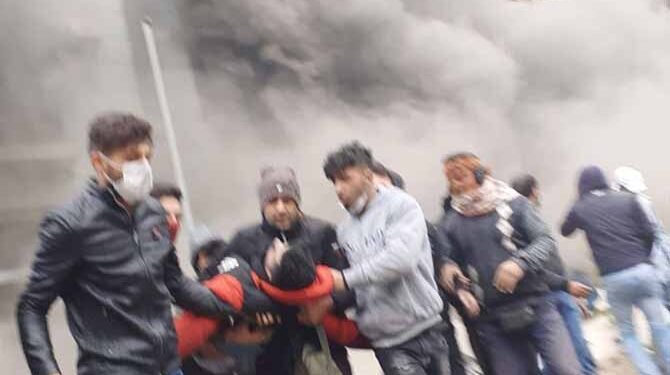A London-based Human Rights Organization says Iranian authorities have pressured the families of those killed in Iran protests in November 2019 to settle for proposals of money and “martyrdom”.
Six months after at least 1,500 Iranian protesters and civilians were killed in Iran protests during November 2019, the Iranian regime has not yet initiated any judicial investigations to prosecute those involved in the unlawful killings.
Instead of being provided answers, the victims’ families have had to settle for proposals of money and ‘martyrdom’.
Published on May 16, Justice for Iran’s report “Mockery of Justice: State’s Policies and Laws Regarding the Victims of Iran’s 2019 November Protests,” confirms that the Iranian authorities refused to undertake judicial investigations or criminal proceedings on the deaths of protesters who took to the streets after a sudden rise in the price of fuel on November 15, 2019.
To prepare its report, Justice for Iran collected, geo-located, and analyzed over 1,200 publicly available videos. The organization also corroborated the videos with eyewitness accounts. It concluded that “in less than 5 days, in 39 cities, across 15 provinces of Iran, the state armed forces used potentially lethal means (including live ammunition and metal plates) and killed hundreds of people.”
Justice for Iran also underlined the fact that the authorities first classified the victims into three categories of bystanders, protestors, and armed rioters. The families of each group of victims were to be treated differently.
Then, they used two narratives to distort the facts. The first narrative alleged that the victims were killed by suspicious elements among protestors, and the second claimed that the state forces deployed lethal force only when protestors posed threat to the lives of people.
According to this official policy endorsed by the mullahs’ supreme leader, Ali Khamenei, the victims in the first group are recognized “as martyrs” and their families should receive blood money, as well as monthly wages and other benefits from the Foundation of Martyrs and Veterans Affairs.
The families of those in the second group should receive only blood money.
The families of the third group receive nothing, and the authorities would somehow console them if found to be “decent and respectful.”
Nonetheless, the policy does not recommend initiating any judicial investigation into the events to identify and prosecute the perpetrators, considering all the killings during the protests as lawful, Justice for Iran said.
The accounts collected from the families of 48 victims across Iran, and documented in the “Mockery of Justice”, reveal that a state-initiated campaign launched shortly after the November protests sought to ensure that there will be no truth or justice.
These accounts reveal that the Iranian regime has been intimidating the families of those killed in Iran protests to prevent them from filing lawsuits, and coercing them to accept and confirm the narratives concocted by the authorities.
According to Justice for Iran, the bodies of some of the victims were released only after their families signed a commitment letter, stating that they would not file a complaint or speak out publicly.
Some families were even forced to confirm in writing, without any investigation, that their loved ones were murdered by rioters and not the state armed forces.
Shadi Sadr, Co-Director of Justice for Iran, pointed out, “Persecuting, intimidating, and buying off the families of victims, the authorities try to give the status of martyrdom to as many victims as possible. This is in line with their efforts to establish their narrative of the events, alleging that the victims were killed by suspicious elements among protestors.” The report documents 23 accounts of them.
The findings of the report confirm that some families who have declined the authorities’ proposals and insisted that the perpetrators should be identified and tried, were told their loved ones were rioters and they were not entitled to take any measures and were promised a criminal proceeding, Justice for Iran said.
Justice for Iran has also collected information on 19 other families of the victims killed in Iran protests who had not filed legal complaints, were approached by the authorities with the same propositions.
10 families were offered blood money. They were told that they would enjoy the status of a martyrs’ families, provided that their loved ones were recognized as innocent and the family would cooperate with the authorities and consider their case settled.
The Iranian authorities have refused so far to announce the exact number of the victims.











